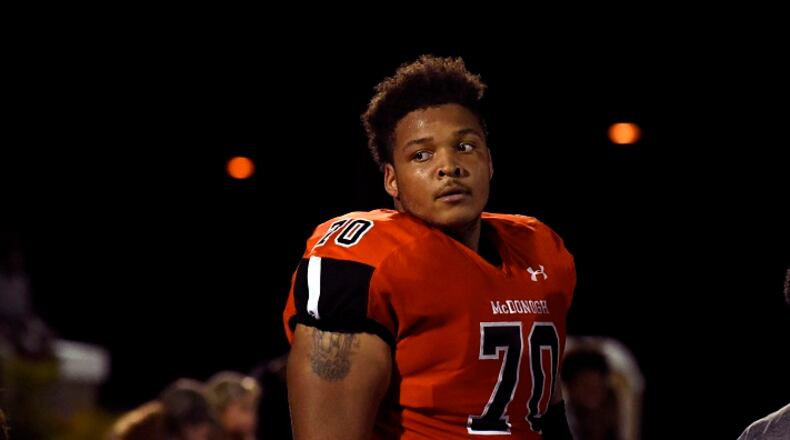In the University of Maryland Medical Center hospital wing where he had lain five years earlier, battling for his life, Gavin Class leaned over the bed of Jordan McNair, grasped his hand and whispered to him.
"Be strong, Jordan," Class recalled saying in his early-June visit. "Fight every day. Be positive."
McNair, 19, an offensive lineman for the University of Maryland football team, had by then been hospitalized at Baltimore's Maryland Shock Trauma Center for a week. After the former McDonogh star collapsed during a late-afternoon May 29 workout, he was taken to Washington Adventist Hospital and later Shock Trauma. McNair died June 13, about a week after Class' visit, of heatstroke.
Maryland's timeline of the day McNair collapsed offers only a general account of what happened from the time he began "having problems recovering" to when a 911 call was placed.
But medical experts said Monday that McNair's health could have hinged on Maryland's adherence to medical guidelines for treating heatstroke, including cold-water immersion — a practice which doctors said likely saved Class' life after he was stricken during a Towson University football practice in 2013.
Attorney William H. "Billy" Murphy Jr. and associate Malcolm Ruff, who are considering filing a lawsuit on behalf of McNair's family, say the firm has corroborating evidence that suggests McNair was showing signs of exertional heatstroke as he completed a series of sprints.
When McNair was taken from the workout in College Park to nearby Washington Adventist Hospital, Ruff told The Baltimore Sun on Monday, medical records indicate his body temperature was 106 degrees, a sign of heatstroke.
Douglas Casa, CEO of the University of Connecticut's Korey Stringer Institute, a nonprofit dedicated to preventing sudden death in sports, outlined a best-practice approach for treating possible heatstroke. The two key diagnostic criteria, he said, are central nervous system dysfunction — signs include confusion, altered consciousness and seizures — and a rectal temperature of at least 105 degrees.
If those symptoms are present, Casa said, cold-water immersion should be used.
"It's the magic elixir," said Casa, who said he has treated over 285 heatstrokes and studied over 2,000 such cases. In cold-water immersion, he added, body temperature can fall about a degree Fahrenheit every three minutes. "That's the thing that's going to allow the person to survive."
Dr. Raj Deu, an assistant professor of orthopaedic surgery at the Johns Hopkins University School of Medicine, said that the more a body is exposed to cold water, the more effective the treatment.
University officials have not said whether McNair's treatment included cold-water immersion. Asked about that, they referred a reporter to their official timeline, which does not mention it. Ruff said Sunday that there were no ice baths present at McNair's workout.
The fallout from McNair's death has thrown the Terps' program into disarray, with coach DJ Durkin and three other staff members placed on administrative leave amid reports of an abusive coaching culture. The university is awaiting the results of an external review of the protocols and procedures relating to the death of the Randallstown native. Walters Inc., a sports medicine consulting firm, is expected to conclude its investigation by Sept. 15.
According to Maryland's timeline, the team's practice began at 4:15 p.m. Athletic director Damon Evans has said players did a "dynamic workout" of 15 to 20 minutes of stretching before turning to 10 repetitions of 110-yard sprints.
The timeline says athletic trainers "began supporting an active recovery and providing care" when they noticed McNair having problems, but the university account does not say what time that happened. Later, the university said, he was taken to the athletic training room on a Gator utility vehicle for "further observation and continued treatment."
Shortly before 6 p.m., according to tapes obtained through a public-records request, a 911 call was placed in which an unidentified caller described McNair as having breathing problems. McNair arrived at Washington Adventist Hospital at 6:36 p.m., according to a Prince George's County incident report. At the hospital, Ruff said, McNair's body temperature dropped to 102 degrees within minutes of cold-water immersion by hospital staff.
Prolonged hyperthermia can cause "large-scale" damage, Casa said. A body temperature around 105.5 degrees is a "critical threshold" for cell damage, he said, but human bodies normally can handle about a half-hour above that temperature without long-term complications.
After that time, Casa said, cells denature. This disruption of their molecular structure "obviously causes things to happen that are not optimal," he said. Vital organs like the kidney, liver and brain can be affected.
"I would say many would die if you go up to 60 minutes [of hyperthermia]," he said.
The doctors who treated Class five years ago have said the treatment he received, including cold-water immersion, was critical to his survival.
Class went to visit McNair in the hospital in June after McNair's family reached out to him.
For Class, the traumas of the two strapping offensive linemen seemed unbearably similar. In August 2013, Class collapsed during a Towson practice and was rushed first to the University of Maryland St. Joseph Medical Center, then to Shock Trauma with kidney failure and a dying liver. His temperature peaked at 108 degrees, and he arrived at Shock Trauma in cardiac arrest. Twice, his parents were told to brace for the worst.
As he lay comatose, awaiting surgery for a liver transplant, his mother, Danielle Class, pleaded with her son: "Keep fighting. Keep fighting. You're strong. Don't give up!"
In June, Class echoed those words as he stood over the bed of McNair, whose family had asked Class to come.
"They were so grateful that I took time to come [to the hospital], though in my mind, there was no option," said Class, 25, an assistant strength and conditioning coach at Johns Hopkins. "I was there to provide hope and to help any way that I could. We talked about our faiths and how God does this to people who can handle it and how it happens for a purpose."
"My family and I prayed for Jordan every day," Class said Monday, the day after the five-year anniversary of his own heatstroke. When he learned McNair had died, "I was in shock; there's no way this should happen."
When Class collapsed at practice, Towson trainers immediately immersed his body, neck-high, in a 300-gallon Rubbermaid tub filled with cold water that they kept on the sideline, the athletic training staff said then. They kept him in the 50-degree water for seven to 10 minutes, while coaches and trainers stirred frantically by hand.
"That time in the ice bath absolutely saved me," Class said.
Keep Reading
The Latest
Featured


